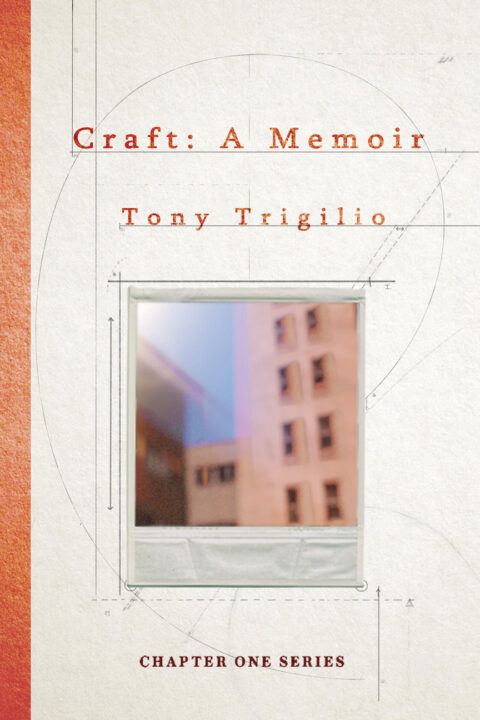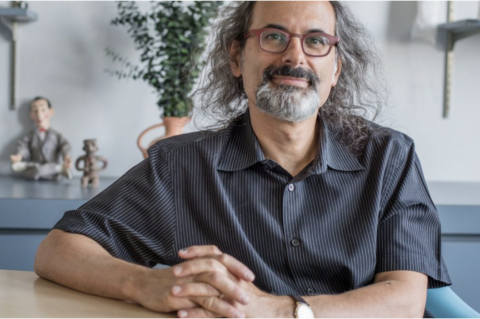Do the words “writing handbook” fill you with excitement and anticipation? … No? Same here. Such volumes can certainly be useful, but they’re not usually designed to be fun.
Poet and critic Tony Trigilio takes a different approach in Craft: A Memoir. His premise is that “the most effective way to learn one’s own craft is through storytelling, rather than the linear, business-memo pragmatism of how-to handbooks.” Consequently, Trigilio tells the story of his own development as a writer in the context of his life more generally. Moreover, he encourages the rest of us to do so. This approach makes for a much more enjoyable and absorbing reading experience than most writing about the craft of writing.
 Craft: A Memoir is a memoir, so it is necessarily idiosyncratic. Some may find that aspect off-putting or too narrow. And Trigilio is primarily a poet. But central to his thinking about poetry is his thinking about storytelling, which involves elisions, ellipses, odd juxtapositions, and unexpected images and connections. “[P]oetic narrative,” he writes, “encompasses more than just plot-based storytelling … Poetic narrative is cross-cut with associational, often interfering images and phrases, and by counterpoint rhythms and voicings that interrupt the trajectory of the standard narrative arc.” This approach may benefit writers of fiction and nonfiction prose, as well as poets.
Craft: A Memoir is a memoir, so it is necessarily idiosyncratic. Some may find that aspect off-putting or too narrow. And Trigilio is primarily a poet. But central to his thinking about poetry is his thinking about storytelling, which involves elisions, ellipses, odd juxtapositions, and unexpected images and connections. “[P]oetic narrative,” he writes, “encompasses more than just plot-based storytelling … Poetic narrative is cross-cut with associational, often interfering images and phrases, and by counterpoint rhythms and voicings that interrupt the trajectory of the standard narrative arc.” This approach may benefit writers of fiction and nonfiction prose, as well as poets.
It is an approach Trigilio follows, as he relates his working-class upbringing in Erie, Pennsylvania; his education at Kent State and Northeastern Universities; and subsequent successful teaching and writing career at Columbia College Chicago. He recounts how, as a child, cartooning became a refuge from a sometimes turbulent home environment. While his father didn’t understand his desire to be an artist, the father and son nonetheless bonded over music (Trigilio has been a drummer for most of his life — a skill that has served him in good stead as a poet). Even more intriguing is Trigilio’s account of how his relationship with his father allowed him to finish a poem for his book Historic Diary (which revolves around the assassination of JFK) in the voice of Lee Harvey Oswald:
“’Oswald, to His Father’ began to take shape as a poem once I recognized that Oswald and I both were emotionally stunted by fathers who were absent because of circumstances no one in the family, especially the fathers themselves, could control … Oswald’s father’s early death, along with my father’s social conditioning that a son becomes a man by neglecting his emotional development, were both, as I write in the poem, ‘safe, virtuous desertion[s].’”
This similarity allowed the poet to empathize with Oswald to the point of being able to write in the latter’s voice: “I had made myself vulnerable enough — as a psychic medium might — for both Oswald’s and my own identities to be superimposed on one another in a poem.” This merger of the personal and the political — the history and the diary — is a source of deep artistic energy for Trigilio. He welcomes our personal responses to history and would have us explore the effects of history on our personal lives. Literature can accommodate the “messy immediate present of nonlinear, sometimes impulsive, human action” that constitutes history, and can do so “in subjective flash-cut scenes, in colliding, associative voices from multiple personas, in scraps of language and imagery, and in found archival material.” So, in addition to making oneself vulnerable and being receptive, another method for generating writing is research. Trigilio insists on the importance of source texts for any poet who writes about history (whether political, social, natural, or personal). But those sources can be found not simply in university archives, but also in “blogging, psychic channeling, documentary writing, arcana, and meditation,” each of which (and more) Trigilio addresses.
Craft: A Memoir strikes me as eminently suited to the undergraduate poetry workshop, not least of all because it revolves around an engaging life’s story. But Trigilio also concisely conveys ideas I oft have taught, but ne’er so well express’d, as when he writes: “readers are more likely to discover themselves in the minute particulars of my ordinary life than in the high-minded puzzle-making of ‘dense language games dotted with occasional moments of true feeling’” (or, I would add, poems drowning in high-sounding abstractions that occlude honest feeling).
 Likewise, Trigilio eloquently explains another paradox I try to convey to students: “I don’t want to exert undue control over my words, but instead want to listen to them, to be gentle with them — to follow where the language wants to go, rather than forcing the words into preconceived notions about the form and content of what I am writing.” Trigilio invokes Jack Spicer’s notion of “The Outside” in writing about the poet-as-medium. Tapping into The Outside means listening to voices other than one’s own, as well as to the voice of the poem itself, “without the editorializing interference of a conscious mind that would domesticate the mysteries of vision in order to make them less unsettling.” Indeed, it’s when your poems scare you, says Spicer, that you know you’re onto something.
Likewise, Trigilio eloquently explains another paradox I try to convey to students: “I don’t want to exert undue control over my words, but instead want to listen to them, to be gentle with them — to follow where the language wants to go, rather than forcing the words into preconceived notions about the form and content of what I am writing.” Trigilio invokes Jack Spicer’s notion of “The Outside” in writing about the poet-as-medium. Tapping into The Outside means listening to voices other than one’s own, as well as to the voice of the poem itself, “without the editorializing interference of a conscious mind that would domesticate the mysteries of vision in order to make them less unsettling.” Indeed, it’s when your poems scare you, says Spicer, that you know you’re onto something.
None of this talk of inspiration obviates the perspiration part, and one finds in Craft: A Memoir some solid practical advice for new writers — e.g., write daily (or weekly, at least). Indeed, it may be that the inspiration only comes to those who’ve done the advance work: “unless you’ve already cultivated a steady writing practice, you might not even notice the lightning crack in the sky — and the electrical charge we call ‘inspiration’ — when it actually does happen.” But Trigilio also acknowledges that life happens, and it isn’t always possible to write every day. Sometimes you’re doing well to schedule a block of writing time twice a week. “Rather than trying to force the writing time into a schedule that might not be able to accommodate it, I try to adapt the needs of my writing to the rhythms of my work life and personal life. All I ask of myself is that I maintain a continuity in my writing practice …” (readers will learn why Trigilio associates this kind of disciplined writing regimen with the smell of sauteed salmon). This consistency, however, complements a less obvious piece of advice: “Be stubborn.” Trigilio describes his family’s stubbornness, which he says he has inherited. But for him, stubbornness means a refusal to give up — on a poem, a publication, or a career. Developing one’s craft and then presuming to share the results is what he calls “an honorable form of audacity,” based on the belief that you have done well and have something to share.
And Trigilio does have something to share. The book is itself a wonderful model of good writing. A craft textbook can be a weighty affair, both literally and figuratively, some of which may be useful pedagogically, some of which will be irrelevant. The body text of Craft: A Memoir is about 100 pages total — there are no words wasted and no superfluous verbiage left. It’s a great reminder of how conciseness and careful editing are essential elements of any good read.
But perhaps the biggest reason I found Craft: A Memoir to be valuable is that it never loses sight of that most central question: What is literature for? What part does it play in your life? Trigilio uses his own life as an example of the way poetry can help one to “untangle what is strange, weird, and sublime” in one’s daily existence, or simply to pay closer attention to it. It is this attention to the big picture, to life as well as art, that makes the book an important contribution to both memoir and to books about the craft of writing more generally.
[Published by Marsh Hawk Press on September 1, 2023. 110 pages. $18.00 US paperback]